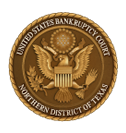You are here
FAQs
-
I can't afford the filing fee for my bankruptcy. Can it be paid in installments?
The filing fees for Chapter 7, 13 and individual Chapter 11 cases can be paid in installments. An Application to Pay Filing Fees in Installments form can be found on our website . Click on the Forms tab and choose Local Forms. A minimum payment of $50.00 is due at time of filing for Chapters 7 and 13, and a minimum payment of $100.00 is due at time of filing for a individual Chapter 11. The Application to Pay in Installments form must accompany your initial payment and petition at the time of filing. If the judge assigned to your case approves the application, the rest of the filing fee will be paid in increments determined by the Judge’s Order every 30 days until fees are paid in full. Missing a fee payment is grounds for dismissal.
Related website links:
"
-
I need to file an adversary proceeding. Is there a filing fee involved?
Yes. The filing fee for an adversary proceeding is $293.00.
If the plaintiff is the United States other than the U.S. Trustee acting as a trustee, the debtor, or a child support creditor or its representative who has concurrently filed an Appearance of Child Support Creditor form in the adversary proceeding, the filing fee will be waived (except in a Chapter 11 case). The ECF system will charge the filing fee, so it is the responsibility of the filing party to send an email to the Court’s Finance Department at nofee@txnb.uscourts.gov requesting that the fee be waived. Make sure to include the adversary case number and an explanation as to why the fee should be waived. In this instance, it is not necessary to file a motion to have the fee waived.
Related website links:
"
-
Does each Bankruptcy Court follow the same rules as it comes to PDF file size?
Each court determines the file size limit. Courts base their decision largely on the volume of filings and server space available.
The Northern District Bankruptcy Court has a file size limit of 25MB, as fully discussed in the entry ‘Is there a file size limit for .PDF documents being filed in ECF?’.
-
My adversary complaint includes the answers to all the questions on the Adversary Proceeding Cover Sheet. Do I still need to file one with my new adversary case?
Even if all of the answers are fully set forth in your adversary complaint filing, you must attach the cover sheet (Form 1040) with each new adversary case that is filed. You may combine the complaint and the coversheet in one .PDF document, or you may file them separately.
Additionally, according to L.B.R. 7003-1 Every adversary proceeding filed in this district shall be accompanied by an adversary proceeding cover sheet.
To file the coversheet separately, log in to ECF, click ‘Adversary’, then ‘Miscellaneous’, and choose the ‘Adversary proceeding cover sheet’ event.
Related website links:
-
A person/company that owes me money recently filed for bankruptcy. How do I file a Proof of Claim?
The Proof of Claim form (Official Court Form B410) can be found on our website at www.txnb.uscourts.gov . Once you have filled out the form, you may file it using the ECF system, electronically right from our website, or you may mail it to the Court for filing.
Related website links:
-
Can a spouse/joint debtor be added to the petition if they were not included on the petition when the case was filed? Can the petition be amended or does the non filing party have to file a new case?
A debtor cannot be added to a petition after it has already been filed. The non-filing spouse would have to file their own petition (new case), then file a Motion to Consolidate the two cases.
-
Appointment of counsel
Counsel is not appointed for Pro Se debtors in Bankruptcy. If a debtor files a bankruptcy Pro Se, they are acting as their own counsel. They are responsible for knowing the Court's local rules, and the federal rules of bankruptcy. They are responsible for filling out their own forms and noticing parties.
